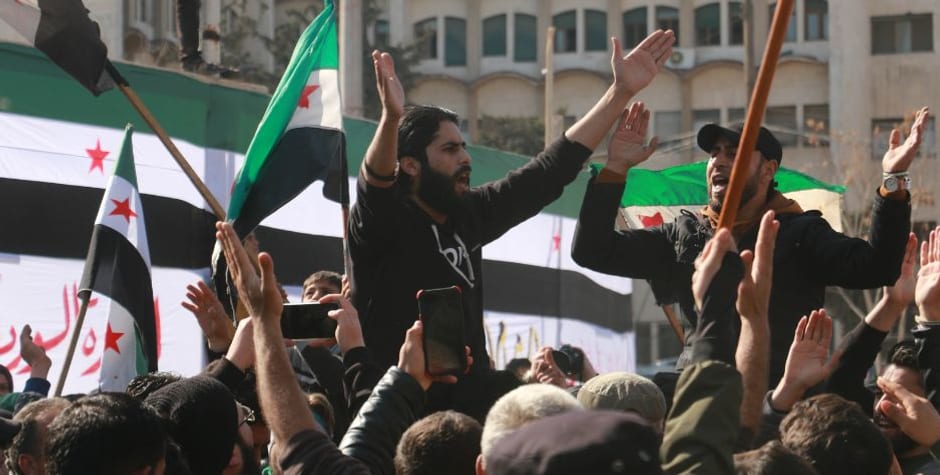

Syrian Christians in Peril: The ECLJ Alerts the Human Rights Council
Syrian Christians in Peril: The ECLJ Alerts the Human Rights Council
On August 4, 2025, the European Centre for Law and Justice (ECLJ) submitted a written statement to the United Nations Human Rights Council, urgently drawing attention to the dramatic plight of Christians in Syria following the rise to power of former jihadist Ahmed al-Charaa. Based on first-hand testimonies, the ECLJ warns of the accelerating disappearance of religious pluralism and the nationwide imposition of Idlib’s Islamist model of centralized governance.
Before the Arab Spring, Syria was home to nearly two million Christians. By the time Bashar al-Assad’s regime fell in December 2024, that number had dropped to 500,000. Since then, the exodus has continued at an alarming pace. “If I ask Christians today what they want, they all answer the same: to leave Syria. They fear for their children’s future and for the safety of women in particular,” said one Syrian bishop.
This fear reached a peak with the June 22, 2025 bombing of the Greek Orthodox Church of Mar Elias in Damascus, which killed 25 and injured 63 during a Sunday service. For Patriarch John X, who has called for unity, “This was not an isolated incident or the act of a lone individual. It was an attack on every Syrian and on the nation itself.” No government official visited the site, except for one Christian minister, Hind Kabawat. “The government bears full responsibility,” the Patriarch declared during the funeral liturgy.
Government Forces Target Alawites and Druze Communities
The violence has not been limited to Christians. In March 2025, more than 1,400 people—mostly Alawite civilians—were killed in fighting across Latakia and Tartus provinces. In July, the Druze community was attacked in Sweida by Sunni Bedouin militias supported by government forces. “We saw the real Syria: tribal gangs calling for jihad against the Druze, entering Sweida to kill, loot, and leave with refrigerators and dishwashers strapped to their pickup trucks. In some cases, women were abducted—not for sexual slavery as under ISIS, but to be ransomed,” described a Syrian academic.
Israel, concerned for its border security and the safety of the Druze population, responded with military strikes, including a hit on the Syrian Ministry of Defense in Damascus. The assault on Sweida left over 1,000 dead, among them evangelical pastor Khaled Mezher (of Druze origin) and his family, as well as 35-year-old American Syrian citizen Hosam Saraya. The Greek Melkite Church of Saint Michael in the village of Al-Sura was burned down, and dozens of Christian homes were looted and destroyed.
The Gradual Islamization of Syria
Despite outward efforts to gain Western approval, interim president Ahmed al-Charaa is pursuing the nationwide implementation of the Idlib model—governed since 2017 by his Islamist faction Hayat Tahrir al-Sham (HTS). This model is characterized by centralized rule, strict enforcement of sharia law, and unregulated economy controlled by networks loyal to the regime. As for minorities, the government tolerates them as little as possible, solely to maintain a façade of diversity.
Christian schools are now required to teach Islamic law, hire principals with degrees in Sharia, and separate boys from girls. “This goes against everything the Christian educational tradition in Syria stands for. It’s unacceptable,” protested a Syrian bishop. In public spaces, religious norms are being aggressively enforced: morality police confiscate alcohol, shut down shops selling it, and monitor interactions between men and women. Preachers broadcast calls to convert through loudspeakers. Anyone not Sunni Arab—Christians, Alawites, Druze, Kurds—is being sidelined.
Justice and Economic Predation Serve the New Regime
On the judicial front, members of the Assad regime—such as General Hassan and Colonel al-Basis—are facing prosecution. No similar proceedings have been initiated against former HTS leaders now serving in government. The mass killings of Alawites in March 2025 resulted in the arrest of only a few low-level figures. “Armed groups are taking justice into their own hands, without waiting for the so-called transitional justice process. What we’re seeing is revenge, not reconciliation,” said a Christian civil society leader.
Meanwhile, with over 90% of Syrians living in poverty, a predatory economic system has emerged under the control of the president’s brother, Hazem al-Charaa. “It’s as if the old secular Baath Party just grew an Islamist beard,” quipped a Christian official. A secret committee, composed of former HTS operatives, has reportedly acquired over $1.6 billion in assets through confidential deals with oligarchs from the previous regime.
The ECLJ Calls for International Action
In response to these alarming developments, the ECLJ calls on UN Human Rights Council Member States to:
- Recognize Syrian Christians as an at-risk group;
- Mandate an independent international investigation into recent massacres;
- Strengthen targeted sanctions against those responsible for human rights violations.
These recommendations are detailed in a formal written statement submitted to the UN Human Rights Council on August 4, 2025.












